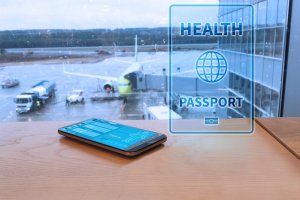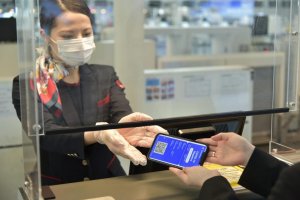In early April 2021, Japan Airlines (JAL) announced that it was beginning trials with three health credential apps—CommonPass, VeriFLY, and IATA Travel Pass.
These apps can help streamline air travel by storing and displaying crucial user data, such as Covid-19 test results and vaccination certificates in a manner that aligns with different countries’ entry requirements.
The health credential apps also prioritize safety with the potential for contactless check-ins. With the apps’ security, time efficiency, and reliability, JAL hopes to utilize them to safely reopen international travel and eliminate the need for arriving passengers to quarantine.
The Health Credential Apps
CommonPass
The CommonPass app, supported by the World Economic Forum, validates COVID-19 test results issued by medical institutions. The developer of CommonPass seeks to replace the nonuniform paper documentation that is currently required for traveling by creating a global standard for users’ COVID-19 data. CommonPass will also ensure travelers’ privacy by not revealing any underlying personal health information. JAL will test CommonPass’s functionality in April 2021 by having a testing facility send COVID-19 results to the app for a flight from Tokyo Haneda to Honolulu.

VeriFLY
VeriFLY, which is already in use in the U.S., is a secure health passport app that helps users manage their destination’s entry requirements. After travelers add their flight details and COVID-19 documentation, the app will show a green check if their information is verified. Travelers can then use this verification to quickly check into the airport. JAL plans to implement VeriFLY for all Japan-North America routes in April 2021.
IATA Travel Pass
IATA Travel Pass is a four-module app that assists users in managing their COVID-19 traveling requirements. The app includes a global registry of health requirements, a global list of testing and vaccination centers, a lab app that shares passengers’ test results and vaccination certificates, and a digital passport that organizes users’ travel documentation. JAL is expected to test IATA Travel Pass in May 2021 on select international flights.
The Takeaway
Overall, CommonPass and IATA Travel Pass seek to become industry standards on a global scale for travel, while VeriFLY, which is already in practical use, can be incorporated into JAL’s international flights between Japan and the U.S.
With these health credential apps, JAL alongside other airlines can more confidently reopen international travel by streamlining check-in processes in a secure and accurate manner that, above all, prioritizes passenger safety. So when travelers arrive in the country, they can safely bypass the quarantining phase and start their adventures right away!
































